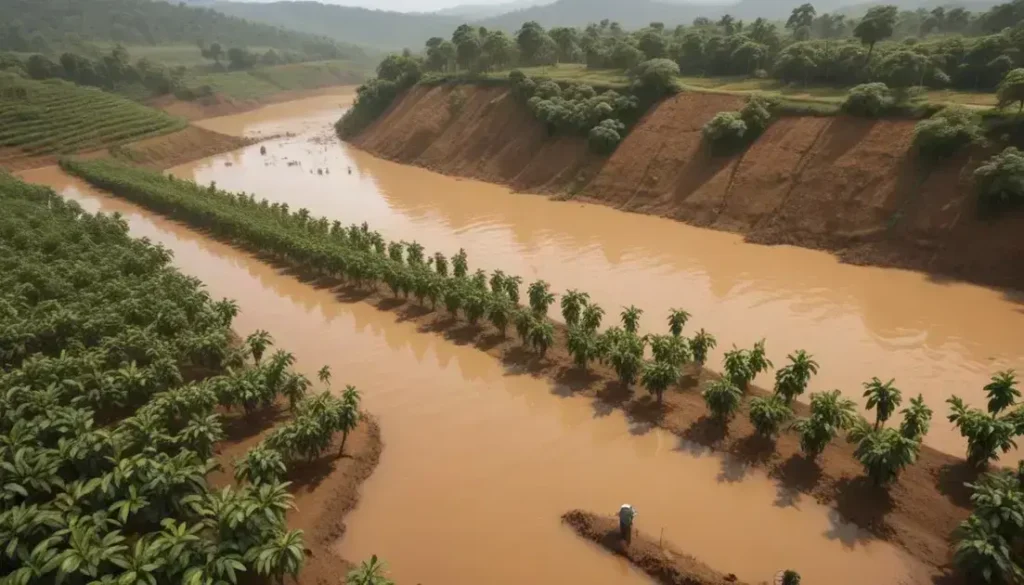The coffee supply chain is significantly impacted by climate change, affecting production and quality, while sustainable practices and collaborative efforts among stakeholders are essential for maintaining resilience and ensuring a stable future for coffee.
The **coffee supply chain** is facing pressing challenges due to climate change, affecting farmers globally and here in Australia. What does this mean for our future?
The current state of coffee prices
As global demand for coffee continues to rise, the current state of coffee prices has become a pivotal concern for both producers and consumers. Market fluctuations are influenced by various factors, including climate conditions, supply chain disruptions, and geopolitical tensions. For instance, the recent droughts in Brazil have significantly impacted coffee yields, driving prices upward.
Moreover, increased transportation costs due to fuel price hikes have further contributed to elevated coffee prices. In addition to that, the ongoing pandemic has introduced numerous challenges, creating delays in shipping and logistics that exacerbate supply shortages. The balance between demand and supply is critical, and any discrepancies can lead to significant price changes.
Another crucial aspect is the price variability between different coffee varieties. Specialty coffees often command higher prices due to their unique flavours and cultivation methods. Consumers are increasingly willing to pay a premium for sustainable coffee sourced from ethical producers. This trend highlights the growing importance of quality and sustainability in purchasing decisions.
In summary, understanding the current dynamics of coffee prices is vital for stakeholders in the industry. As the market evolves, both farmers and consumers must adapt to ensure long-term sustainability and profitability.
Impact of climate change on coffee production
The impact of climate change on coffee production is increasingly evident, presenting significant challenges for growers worldwide. Rising global temperatures have altered traditional growing patterns, resulting in unpredictable weather conditions. These variations, including prolonged drought periods and intense rainfall, directly affect coffee yield and quality.
Regions like Brazil, one of the largest coffee producers, are witnessing shifts in suitable cultivation areas. As temperatures rise, ideal zones for growing high-quality coffee beans are becoming limited. This shift not only threatens the supply of coffee but also jeopardises the livelihoods of millions of farmers who rely on this crop.
Sustainable farming practices are essential in mitigating these adverse effects. Techniques such as agroforestry, which integrates trees with coffee plants, help to regulate microclimates and enhance biodiversity. Additionally, investing in resistant coffee varieties offers hope for adapting to changes in climate.
Consumer awareness of these challenges is also vital. As coffee enthusiasts increasingly prioritise sustainably sourced beans, producers are encouraged to adopt practices that not only counteract climate change but also contribute to the resilience of their farms.
The role of Brazil and Vietnam in coffee supply
Brazil and Vietnam play a pivotal role in the global coffee supply, together accounting for a significant portion of the world’s coffee production. Brazil, as the largest producer, is renowned for its diverse range of coffee beans, particularly Arabica. The country benefits from expansive plantations and ideal growing conditions, which allow for large-scale production.
On the other hand, Vietnam is the largest producer of Robusta coffee beans, known for their strong flavour and higher caffeine content. The Vietnamese coffee industry has rapidly evolved, with an emphasis on increasing quality while maintaining affordability. Vietnam’s focus on robust production has made it a vital supplier for countries seeking cost-effective coffee options.
The interplay between these two nations significantly influences coffee prices and availability in the market. Changes in Brazil’s yield due to climate conditions can lead to immediate price increases, affecting imports worldwide. Moreover, Vietnam’s supply chain efficiency allows it to respond quickly to shifts in demand, making both countries crucial in stabilising coffee availability.
Collaboration and competition between Brazil and Vietnam indicate the dynamic nature of the coffee industry. As global demand rises, understanding their roles is essential for stakeholders aiming to navigate the complexities of the coffee supply chain.
The effects of food supply instability
The effects of food supply instability are increasingly impacting various sectors, particularly in coffee production. Fluctuating prices and inconsistent availability can create uncertainty for farmers and consumers alike. When global supply chains face disruptions, such as those caused by climate change or political tensions, the consequences are far-reaching.
For coffee growers, instability often results in financial strain. Farmers may not receive fair compensation for their harvests, leading to unsustainable practices and reduced investment in quality improvement. This scenario creates a ripple effect, potentially jeopardizing the overall quality of coffee available on the market.
Consumers are not spared either. As supply instability drives prices up, many may find themselves priced out of the coffee market. This situation can lead to a shift in consumer behaviour, with some opting for cheaper alternatives. Furthermore, a lack of transparency in the supply chain can erode consumer trust, impacting brand loyalty.
Addressing food supply instability requires collaboration across the entire coffee market, from producers to consumers. Implementing better forecasting models, diversifying sources, and enhancing supply chain resilience are essential steps towards ensuring that both farmers and consumers can thrive in a fluctuating market.
Climate impacts: case studies from Brazil
The climate impacts on coffee production in Brazil are profound, making case studies from the region critical for understanding these challenges. Brazil, as the world’s largest coffee producer, has been increasingly affected by changing weather patterns. These shifts include rising temperatures, irregular rainfall, and extreme weather events.
One notable case study highlights the state of Minas Gerais, where coffee farmers have observed significant declines in yield due to prolonged droughts. The reduced water supply affects not only the quantity but also the quality of the coffee. Farmers in this region are adapting by implementing water conservation techniques and exploring new irrigation methods.
Another important case study can be found in São Paulo, where increased rainfall and flooding have disrupted harvesting seasons. The excess water not only damages coffee plants but also leads to the proliferation of pests and diseases. Farmers are now investing in resilient planting strategies and selecting coffee varieties that can withstand such climatic extremes.
These examples underscore the urgent need for Brazilian coffee producers to adopt sustainable practices and technologies. By learning from these case studies, farmers can better navigate the complexities of climate change and ensure the future viability of coffee production in the region.
Responses from major coffee companies
The responses from major coffee companies to climate change and supply chain challenges reveal a growing commitment to sustainability and resilience. Many leading brands are increasingly recognising the importance of transparent sourcing and ethical practices to secure their future.
One significant strategy adopted is the implementation of sustainable sourcing programs. Companies like Starbucks and Nestlé are investing in initiatives that support farmers through fair trade practices and direct trade relationships. These programs aim to improve farmer livelihoods and ensure high-quality coffee supply.
In addition to ethical sourcing, major brands are focusing on innovation in farming practices. Companies are collaborating with agricultural scientists to develop climate-resilient coffee varieties. These new strains are designed to withstand extreme weather conditions, thereby helping farmers maintain productivity despite climate uncertainties.
Moreover, many coffee companies are enhancing their involvement in local communities. By providing education and resources, they empower farmers to adopt sustainable practices and adapt to changing environmental conditions. This holistic approach not only secures supply chains but also promotes a more sustainable coffee industry overall.
Future prospects for coffee supply chains
The future prospects for coffee supply chains are becoming increasingly significant as the industry adapts to various challenges, including climate change and market volatility. As global coffee demand continues to rise, companies must innovate to ensure a steady and sustainable supply.
One of the key trends emerging is a focus on digital transformation. Many companies are investing in technology to enhance transparency within the supply chain. This includes traceability systems that allow consumers to see where their coffee originates, thereby fostering trust and encouraging ethical sourcing.
Another important aspect is the push towards sustainability. Coffee producers are adopting environmentally friendly practices, such as agroforestry and organic farming, to reduce their carbon footprint. These methods not only help combat climate change but also improve the resilience of coffee crops against adverse weather conditions.
Furthermore, collaboration among stakeholders is essential. By forming partnerships between producers, corporations, and governmental agencies, the coffee industry can address systemic challenges and create more robust supply chains. This collaborative approach may lead to enhanced access to resources, technology, and training for farmers, ensuring that they can meet future market demands.
Strategies for Australian farmers
Strategies for Australian farmers in the coffee industry are evolving in response to climate change and fluctuating market demands. To maintain productivity and sustainability, farmers are adopting innovative practices that enhance resilience. One key strategy involves diversifying coffee varieties grown on farms. By planting a mix of Arabica and Robusta coffee, farmers can better adapt to changing climate conditions and varying consumer preferences.
Another important approach is the implementation of sustainable farming techniques. This includes practices such as soil conservation, integrated pest management, and organic farming, all aimed at reducing environmental impact. By promoting biodiversity and healthier ecosystems, these methods can improve the overall quality of coffee produced.
Investment in technology also plays a significant role in modernising the coffee farming sector. Farmers are increasingly utilising data analytics and precision agriculture tools to monitor crop health and optimise resource use. These technologies enable more informed decision-making and help maximise yields while minimising waste.
Collaboration among growers is essential for sharing knowledge and resources. Australian farmers are forming cooperatives to enhance bargaining power and access markets more effectively. Through collective efforts, they can ensure better prices and work towards a more sustainable coffee supply chain.
The importance of sustainable farming practices
The importance of sustainable farming practices in the coffee industry cannot be overstated. As environmental challenges continue to escalate, adopting these practices is essential for the longevity of coffee production. Sustainable methods not only benefit the environment but also enhance the overall quality and flavour of the coffee.
One key aspect of sustainable farming is the emphasis on biodiversity. By planting a variety of crops alongside coffee, farmers can create a balanced ecosystem. This diversity helps to control pests naturally and improve soil health, leading to better yields. Additionally, maintaining a healthy landscape supports wildlife, which also contributes to pollination and natural pest management.
Water conservation practices are another critical component. Implementing techniques such as drip irrigation and rainwater harvesting ensures efficient water use. Given the increasing unpredictability of rainfall patterns, these methods are vital for maintaining crop health and productivity.
Moreover, sustainable farming practices often align with ethical sourcing standards. Farmers who prioritise sustainability are more likely to produce high-quality coffee that appeals to environmentally conscious consumers. This creates a competitive advantage in the market, as more coffee drinkers seek products that are responsibly sourced and produced.
Collaborative efforts to tackle climate change
Collaborative efforts to tackle climate change in the coffee industry are becoming increasingly essential as the impacts of global warming intensify. Various stakeholders, including farmers, NGOs, and coffee companies, are recognising that collective action is vital for creating lasting change.
One significant initiative is the establishment of partnerships between smallholder farmers and large coffee corporations. These partnerships aim to share resources, knowledge, and technology to enhance sustainability. By working together, farmers gain access to better farming practices and tools, while companies secure a more reliable supply of high-quality coffee.
Additionally, initiatives such as certification programs promote sustainable practices and provide financial incentives for farmers who adhere to environmentally friendly methods. Certifications like Fair Trade and Rainforest Alliance empower communities and encourage them to invest in climate-smart agriculture.
Moreover, collaborative research projects involving universities and agricultural organisations address key challenges related to climate change. These studies focus on developing resilient coffee varieties and exploring innovative farming techniques that mitigate environmental impacts. By pooling knowledge, these collaborations aim to equip farmers with the tools necessary to adapt to changing climate conditions.
Conclusion and call to action
This section is typically reserved for summarising key insights and presenting a strong call to action. To effectively engage your audience, it’s essential to reiterate the significance of sustainable practices in the coffee industry and the impact of climate change on production. Encouraging readers to support ethical coffee brands and consider their consumer choices can foster greater awareness.
Encouraging community involvement is crucial. Highlight opportunities for readers to participate in local initiatives or support organisations that advocate for sustainable farming. These actions not only facilitate immediate change but also contribute to broader efforts aimed at combating climate change.
Moreover, educating consumers on the importance of traceability in coffee sourcing empowers them to make informed decisions. As coffee lovers, they have the power to influence market trends by choosing to purchase from companies committed to responsible and sustainable practices.
Ultimately, every individual can contribute to a more resilient and sustainable coffee supply chain. By understanding their role as consumers, readers can actively participate in a collective movement towards protecting the future of coffee and its growers.
In conclusion, the future of coffee depends on our actions today
Climate change poses significant challenges to coffee production, but by embracing sustainable practices and collaborating across the industry, we can protect this beloved beverage. From farmers to consumers, everyone has a role to play in ensuring that coffee remains available for future generations.
By supporting ethical sourcing and being mindful of our coffee choices, we can drive change and promote healthier ecosystems. Together, we must advocate for sustainable farming methods and foster innovation in the coffee supply chain.
Ultimately, it is our collective responsibility to enjoy coffee while caring for the planet. Let us work together to create a sustainable future for coffee, benefiting both those who grow it and the environment we all share.
Frequently Asked Questions
How does climate change affect coffee production?
Climate change impacts coffee production by altering rainfall patterns, increasing temperatures, and causing extreme weather events, which can lead to lower yields and reduced quality.
What sustainable practices can coffee farmers adopt?
Coffee farmers can adopt practices like agroforestry, organic farming, and efficient water management to enhance sustainability and improve crop resilience against climate change.
Why is ethical sourcing important in the coffee industry?
Ethical sourcing ensures that farmers receive fair compensation for their products, promotes sustainable farming practices, and fosters consumer trust in the coffee supply chain.
How can consumers support sustainable coffee practices?
Consumers can support sustainable coffee practices by choosing brands that prioritise environmental responsibility, fair trade, and transparency in their sourcing methods.
What role do coffee companies play in combating climate change?
Coffee companies can invest in sustainable farming initiatives, promote research on climate-resilient coffee varieties, and establish partnerships with farmers to support environmental efforts.
What is the significance of collaboration in the coffee industry?
Collaboration among farmers, consumers, and companies enhances knowledge sharing, resource access, and fosters collective efforts to tackle climate challenges and promote sustainability.


